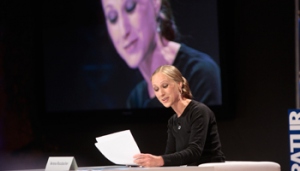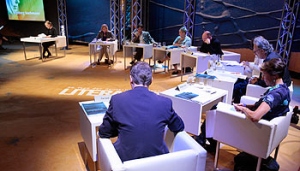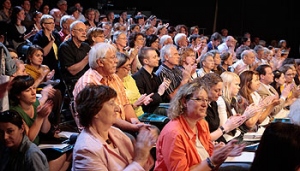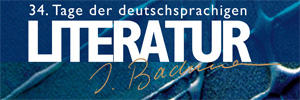 Verena Rossbacher (Bild: Johannes Puch)
Verena Rossbacher (Bild: Johannes Puch)
Verena Rossbacher (A)
An Austrian “Alphabet der Indizien” [alphabet of circumstantial evidence] concluded the readings at this year’s Festival of German-Language Literature: Verena Rossbacher was the last one to compete with her novel excerpt “schlachten” [slaughtering].
This experimental text caused the jury to oscillate between “ethnic matters”, “Bible study” and “fundamental philosophy” (Clarissa Stadler).
Pensively, rushing, someone is jumbling letters, words and life, lets fractals of thought wander, loses control over his own head, a “fairground” and “collection of the curious”, while quite incidentally asking questions about God and man’s position in His Creation.
Author portrait
Reading
Discussion
“Language machine running full blast”
“For me, Verena Rossbacher is a language machine running full blast”, was Karin Fleischanderl’s first contribution, and: “I don’t want to dispute the text’s quality at all.” Nonetheless, what bothered her about the text was its “euphorising character”, the “feeling of sitting in an aeroplane before it takes off – but someone is holding down the clutch and therefore there is no transmission.”
 Verena Rossbacher (Bild: Johannes Puch)
Verena Rossbacher (Bild: Johannes Puch)
The language, Fleischanderl believes, does not capture “an object” and therefore points to a vacuum. What’s more, “the German colleagues”, said Fleischanderl, addressing the jury in general and Burkhard Spinnen in particular, “have little feel for and understanding of the Austrian tone” in literature, which for the Klagenfurt competition often means that the invited authors “are either not understood at all” or people are “being dazzled” – like Burkhard Spinnen is now.
The chairman’s response was initially relaxed: “I don’t yet know what I have done wrong, but I am sure we will get to it.”
Feßmann: “Horribly stilted text”
Meike Feßmann, too, was evidently unhappy about Spinnen’s selection when she remarked: “A horribly stilted text whose stiltedness was further emphasised by the affected presentation of it. The text carries its main message like a flag, tooting like a vuvuzela, namely: I am art, I am art, I am art.”
 Jury (Bild: Johannes Puch)
Jury (Bild: Johannes Puch)
Sulzer: "Nach drei Seiten aufgehört zu lesen"
“The first time round, I stopped reading after three pages”, said Alain Claude Sulzer, who recognised “beautiful images” in the text, but the author’s presentation of it “completely ruined” it. “By accident” Rossman’s presentation generated “excitement”, “things went up and down”, which caused him to believe that the text, which he initially thought “interesting and daring”, “was not meant the way” he had understood it.
Jandl: “Soon the loud ringing was enough”
“Somewhere in the text is says: the milk boiled over – that’s really where we should stop arguing”, said Paul Jandl, and finally decided to say a few illuminating things about the “biblical sex scenes”.
Nonetheless: “Soon the loud ringing was enough for me. These are naive and beautiful Chagall paintings – I am not taken by it”, said Jandl.
 Publikum (Bild: Johannes Puch)
Publikum (Bild: Johannes Puch)
Winkels: “Chaos theoretical self-similarity”
Hubert Winkels was more conciliatory. He believed that his colleagues’ analysis only concerned the beginning of the text. Rossbacher’s text, with its “chaos theoretical self-similarity” is both “exuberance” and the “mixing and distortion” of thousands of verbs: the narrator residing in the man’s head acts in a “boundary blasting way”.
Spinnen: “Watching people think”
“What is it that I read there”, Burkhard Spinnen asked himself. “Admittedly, a little bit less than my own attempts at getting to the bottom of things.” But, this is about the greatest literary concern of all: the attempt to watch people think. “Thoughts are expressed in language” and this is “taken seriously” here: “I like pregnant mutterings.”
“Language and text need an organising entity. Here, this is being refused – as an artistic programme”, was Hildegard Elisabeth Keller’s criticism, which is why the text “exhausted” her. As alluded to in the title, the reader is being “slaughtered” together with the language.
 TDDl 2010
TDDl 2010